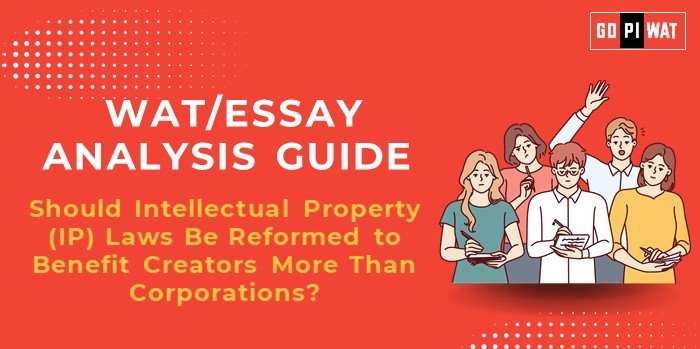📋 Written Ability Test (WAT) Analysis Guide
🌐 Topic: Should Intellectual Property (IP) Laws Be Reformed to Benefit Creators More Than Corporations?
🌟 Understanding the Topic’s Importance
📜 Context: The essay’s relevance lies in exploring fairness, economic growth, and legal challenges in global IP regimes.
📝 Effective Planning and Writing
- ⏳ Time Allocation:
- 🕒 Planning: 5 minutes
- ✍️ Writing: 20 minutes
- 🔍 Review: 5 minutes
📖 Introduction Techniques for Essays
- ✨ Contrast Approach: “While corporations own over 60% of patents, creators often struggle for recognition and fair earnings, raising critical questions about reforming IP laws.”
- 📜 Timeline Approach: “From the Industrial Revolution to today’s tech age, IP laws have evolved, yet their fairness for creators remains contentious.”
🏗️ Structuring the Essay Body
✨ Achievements
- 📈 Economic Growth: IP laws have spurred significant economic and technological advancements.
- 💡 Innovation Incentives: Providing rewards for innovators encourages continuous breakthroughs.
- 🌍 Global Standards: Frameworks like the TRIPS Agreement promote consistency across nations.
⚠️ Challenges with Comparative Analysis
- 🏢 Corporate Monopoly: Over 60% of patents are held by corporations, limiting creators’ control.
- 💰 Cost Barriers: High filing and legal costs exclude small-scale creators.
- 🌍 Inequities: Contrasts like the US’s corporate-focused IP regime vs. Sweden’s creator-friendly policies highlight disparities.
🔮 Future Outlook
- ⚖️ Policy Reforms: Emphasize equitable IP distribution and protections for individual creators.
- 🤝 Public-Private Collaboration: Encourage partnerships to democratize innovation funding.
✅ Concluding Effectively
- ⚖️ Balanced Approach: “While IP laws have driven innovation, reforms are essential to balance creator rights and economic goals.”
- 🌍 Global Comparison: “Drawing from global successes, reforms in India and Sweden offer pathways for equitable IP laws.”
📊 Analyzing Successes and Shortcomings
- 🏅 Achievements: Innovation and economic growth driven by strong IP protections.
- ⚠️ Challenges: Persistent disparities and accessibility issues for small-scale creators.
- 🌏 Global Context: Learnings from Sweden’s pro-creator policies, India’s emerging reforms, and the US’s corporate dominance.
📈 Recommendations for Sustainable Progress
- 📝 Simplify IP Filing: Reduce bureaucratic hurdles and costs for creators.
- 🤝 Revenue-Sharing Mandates: Require fair compensation structures between creators and corporations.
- 💡 Innovation Funding: Encourage public-private partnerships to support small creators.
📘 Sample Short Essays
Balanced Perspective
“IP laws must evolve to balance creator rights with corporate benefits, ensuring innovation thrives in all sectors.”
Solution-Oriented
“Reforming IP laws to mandate fair revenue-sharing could empower creators while maintaining corporate innovation.”
Global Comparison
“Countries like Sweden exemplify how IP reforms can benefit creators and corporations, providing a model for global adoption.”


